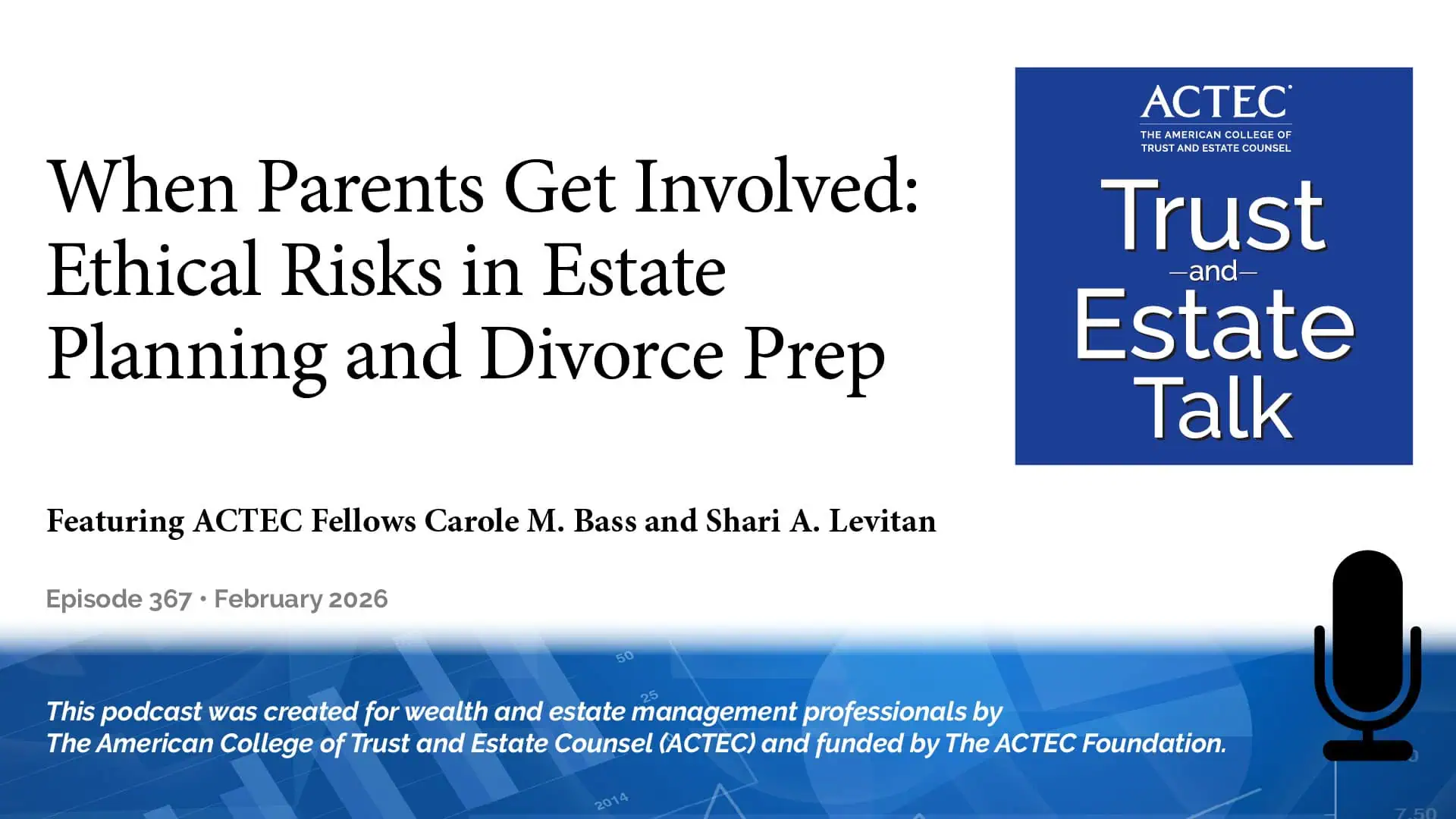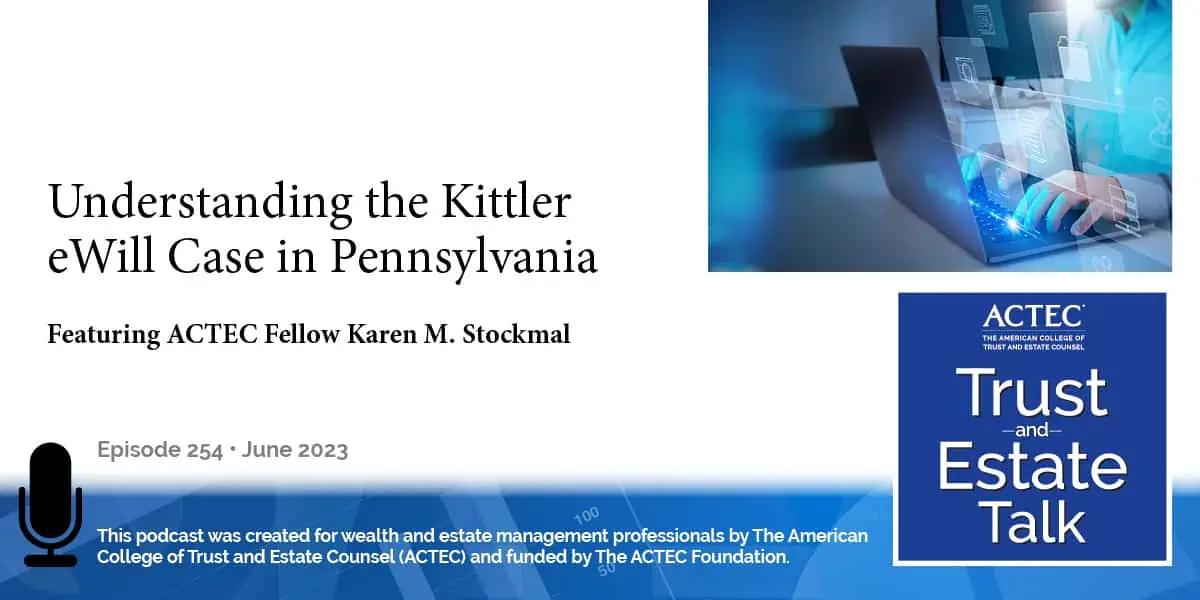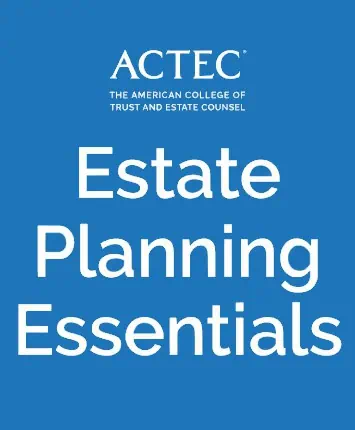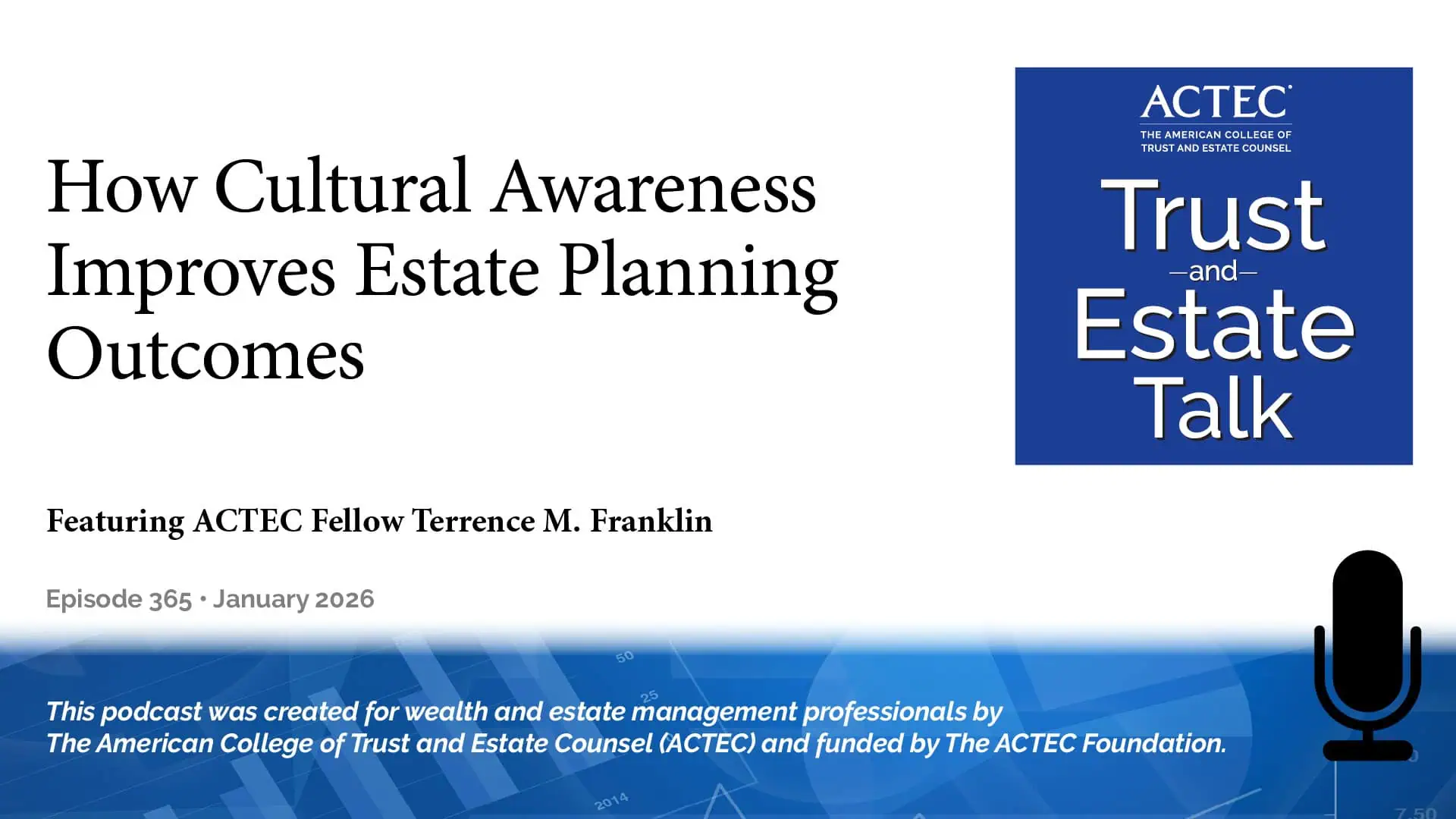Understanding the Kittler eWill Case in Pennsylvania
“Understanding the Kittler E-Will Case in Pennsylvania,” that’s the subject of today’s ACTEC Trust and Estate Talk.
Transcript/Show Notes
This is Travis Hayes, ACTEC Fellow from Naples, Florida. During the height of COVID in 2021, Susan Kittler of Lancaster County, Pennsylvania, drafted a will and executed it using a DocVerify electronic signature. ACTEC Fellow, Karen Stockmal from Berwin, Pennsylvania, joins us today to explain the case and share the outcome. Welcome, Karen.
Thank you. This case is in re-estate of Susan Kittler, deceased. It’s case number 2022-0236, and it was filed in the Court of Common Pleas of Lancaster County, Pennsylvania. The petitioner, who was the decedent’s son, appealed the Register of Will’s refusal to probate the will. Susan Kittler was hospitalized in late 2020 after a fall. During this stay, she also received a cancer biopsy, which resulted in a bone cancer diagnosis. At the time, she was living in a nursing home that, like everywhere else at this time, was under lockdown because of the COVID-19 pandemic.
Kittler E-Will Case Introduction
Due to her declining health, Susan wanted to execute a will and put her affairs in order. Her two sons and daughter-in-law met with an attorney to discuss preparing Susan’s estate plan documents. After that initial meeting, Susan and the attorney met and had a detailed conversation about her wishes. Everyone involved, including Susan’s family and her financial advisor, was clear about how she wanted her assets to pass. The will was drafted accordingly, leaving all assets equally to Susan’s two sons. Because of the pandemic lockdown, Susan and her attorney could not meet in person to execute the will. Instead, the will was executed using video conference technology.
Her attorney and two witnesses were present at the attorney’s office. The notary was in her own home and Susan was in her residence at the nursing home for the video conference. The Pennsylvania legislature had authorized temporary remote notarizations during the pandemic. But not only did the notary and witnesses sign electronically, in this case, Susan signed the will with a digital signature using software known as DocVerify. Susan passed away in October 2021 and her son, through his counsel, filed the probate petition in Lancaster County in January of 2022.
Current Pennsylvania E-Will Laws
The validity of the remote notarization was not challenged, but the Register of Wills denied the petition because of the decedent’s digital signature. The issue before the court was whether the will’s digital signature was valid under Pennsylvania law. The petitioner’s argument that the will was valid because it was a writing that was signed by the decedent at its logical and sequential end and clearly had testamentary direction. This petition was eventually denied. The document was ruled to be invalid under Pennsylvania law.
Interestingly, the assets then passed by intestacy, which the will mirrored anyway. The court specifically noted that the assets would pass to the two sons either by the will or through intestacy and elected not to approve the will for probate. Noting that there was no great injustice, in this case, may have been one factor in the decision to disqualify the will. The holding of the case was that the electronic signature failed to meet the legal standard in Pennsylvania for a signature upon a will. To be a valid signature, the court opined, the testator must physically put ink to paper.
E-Will Court Opinion Tasks Pennsylvania Legislature
The court noted that it is likely that electronic signatures will become more pervasive and that we will see more cases like this. The court believed that it was the job of the legislature and not the court to specifically draft legislation under which estate planning documents could be executed remotely. They noted that the Pennsylvania Electronic Transactions Act, which generally permits electronic signatures on certain legal documents, specifically excludes estate planning documents, further bolstering the court’s reasoning.
Again, they noted that revision of the signature requirement is a task for the legislature and not the courts. In so holding, we continue to meet with clients in person to have them execute their documents, or at the very least, to send them their documents so that they may put pen to paper and sign the documents, even if we cannot be with them. Thank you.
Travis: Thank you, Karen, for discussing the interesting case of the Kittler E-will. Stay tuned for an upcoming podcast from ACTEC Fellow David Marchetti, who will discuss the issues of another E-will case involving a holographic will that was written with a stylus and an iPad.
You may also be interested in:
If you have ideas for a future ACTEC Trust & Estate Talk topic, please contact us at ACTECpodcast@ACTEC.org.
© 2018 – 2026 The American College of Trust and Estate Counsel. All rights reserved.
Latest ACTEC Trust and Estate Talk Podcasts

Estate Planning Considerations in Community Property States Relating to Retirement Accounts
Explore how community property laws shape IRAs, 401(k)s, beneficiary designations, and spousal rights in retirement account estate planning.

When Parents Get Involved: Ethical Risks in Estate Planning and Divorce Prep
When parents join prenup or divorce planning, ethical risks follow. ACTEC Fellows explore privilege, conflicts, and protecting the attorney-client relationship.

Useful But Overlooked Trusts: A Planner’s Guide to When and How to Use Them
Explore overlooked trusts—including HEETs, alimony, voting, and blind trusts—and when estate planners should use them to address complex client needs.



